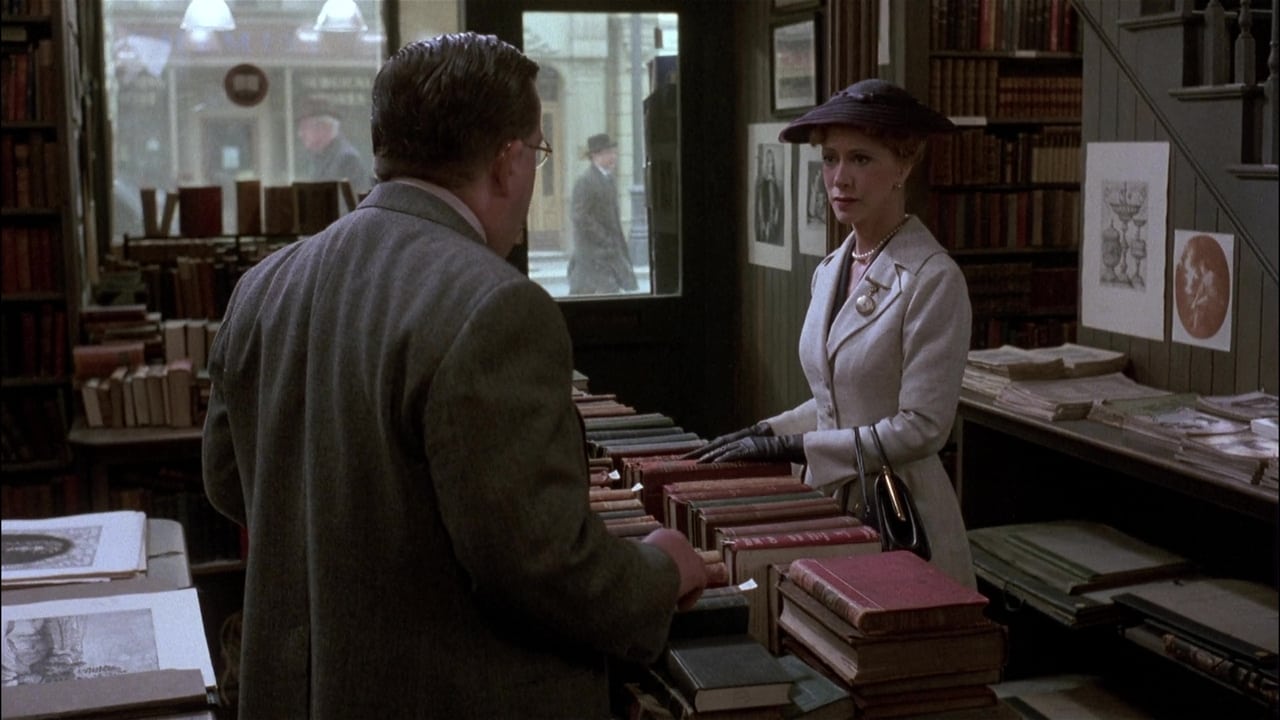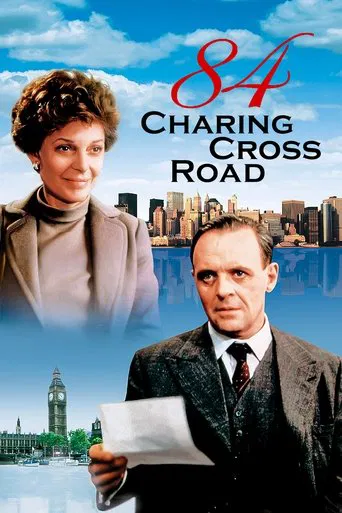

SERIOUSLY. This is what the crap Hollywood still puts out?
... View MoreA different way of telling a story
... View MoreIf the ambition is to provide two hours of instantly forgettable, popcorn-munching escapism, it succeeds.
... View MoreThere's a more than satisfactory amount of boom-boom in the movie's trim running time.
... View Morea film about friendship. in a special form. about books. about different manner to see the life. and about special refuges against every day pressure. it is not easy to define its source of seduction. the script, the acting, the chain of titles, the letters,her enthusiasm, his polite answers, the flavor of two different places and cultures and personalities. it is seductive, fascinating and touching. and useful for the birth of special emotions. romantic and smart and delicate and precise. best choice for admirers of a cinema of substance and redefine of life basic purpose. for the lovers of old books. and for the fans of great acting. Anne Bancroft and Anthony Hopkins. and sure, in a small role, admirable Helen Mirren. the memory of this film remains long time. with real useful result.
... View MoreCharing Cross Road is a street in central London, running between Trafalgar Square and Oxford Street. (Rather confusingly, Charing Cross Station does not actually lie in this street). It is a centre of the London book trade, renowned for its bookshops (Foyles being the most famous), selling both new and second-hand books. 84 Charing Cross Road was the address of the antiquarian booksellers Marks & Co, although the firm no longer exists. (The building, which now bears a different address, is today a restaurant).Helene Hanff's book "84 Charing Cross Road" was one of the unexpected publishing successes of 1970, even though it is only a compilation of letters passing between Miss Hanff herself and Frank Doel, the manager of Marks & Co. The book was later turned into a play, which in its turn served as the basis for this film.The story is a simple one. In 1949 Helene Hanff, a voracious reader of all types of literature ("except fiction"), is unable to find a number of classic works of British literature in her native New York City. She notices a newspaper advertisement placed by Marks & Co and in desperation writes to inquire if they can supply any of the missing titles. Doel writes back to say that they have most of the books in stock. Hanff continues ordering books from the company and over the years her relationship with Doel evolves into a long-distance friendship. They correspond about all manner of topics, not just about literature but about family matters and current events. Hanff cherishes the hope that one day she will be able to visit London and see the bookshop for herself, but she is unable to afford the fare until 1971, by which time Doel has died and the shop closed.Both the leading actors, Anne Bancroft and Anthony Hopkins, are excellent. They dominate the film; all the other actors, including its third "big name" Judi Dench as Doel's wife Nora, have comparatively little to do. Hopkins is sometimes regarded in specialising in forceful, flamboyant or monstrous characters such as Hannibal Lecter or Captain Bligh in "The Bounty", but in fact he can be equally good as quieter, more restrained individuals, such as Dr Treves in "The Elephant Man", the butler in "The Remains of the Day" or C S Lewis in "Shadowlands", and Frank Doel is another similar character.And yet, despite the quality of the acting, this has never been one of my favourite films. When I read Hanff's book (admittedly a long time ago) it never struck me as a naturally dramatic story, so I was surprised when it was adapted for the cinema. The film's rather static nature betrays its origins in a stage play, and I was not surprised to learn that the director, David Hugh Jones, was a well-known theatrical director with little experience of working in the cinema. (This was only his second film).I think, however, that the fault lies not so much with Jones's direction as with the nature of his material. The eighties saw a number of distinguished adaptations of stage plays for the screen, such as Willy Russell's "Educating Rita" and "Shirley Valentine" or the Dustin Hoffman version of Miller's "Death of a Salesman". None of those dramas contain much in the way of physical action, but they do contain plenty of dramatic conflict, what might be called emotional action. There is nothing of that in "84, Charing Cross Road". Hanff's book is little more than a record of two nice people being nice to one another over a period of two decades. Although she can occasionally be sharp-tongued when a book she has ordered fails to meet her expectations, she is really very kind-hearted, something shown when she sends food parcels to Doel and his colleagues, suffering from post-World War II austerity, and he always comes across as the perfect English gentleman. Their relationship never generates enough dramatic tension to make this an altogether successful film.On a final note, I have never understood just why Helene Hanff found it so difficult to find the books she wanted. It might have been more understandable had she been living in a remote small town, but were New York bookshops in the forties and fifties really so badly stocked that they did not carry the works of such major British authors as Chaucer, John Donne, Pepys and Jane Austen? 6/10, largely for the quality of the acting.
... View MoreAnyone who knows London knows and loves Charing Cross Road that has been able to resist any kind or urban change, even recent urban renovation, since I first stepped into it in 1960. I have walked it up to Tottenham Court Station and Road and down to Trafalgar Square and the National Gallery more often than Champs Elysées in Paris or Broadway in New York. It is for me one street I love discovering every single time I am in London with all its book stores, Covent Garden on one side and Soho on the other side, Leicester square on that other side, and the National gallery at the bottom of the street not to speak of Saint Martin's in the Fields and its underground crypt where you can eat with the ghosts. Fifty years haunting that place, that road, its shops, theaters, churches and left or right hinterlands. The Strand next to it is nothing and I can live without ever setting one toe of one foot in it, but Charing Cross Road This film is thus nostalgic about what it was, and still is, in spite of the death of two people and the closing of Marks books that I actually visited before it closed, or it might be another one, they were and are all just as beautiful and intriguing. But the film is not about nostalgia for some place you have visited and loved, not even a person you have loved and lived with in a way or another, but about a service you can only get from true secondhand bookstores because they don't sell books but they sell the books they love and cherish to people who love and cherish them just the same. These secondhand bookstores and booksellers have a charm that is not only quaint but is like an accomplice-ship in the crime of loving books, old books, beautiful books, books that have been used, visited and read by what we imagine are hundreds of people. The last book I got from England is from the University Library of Leeds, still with its barcode, its number, its Reference tag, its "not to be borrowed" tag and a book that was published in 1960, precisely, fifty years ago, a book no one can find any more except in university libraries and I have it on my desk, as if I had borrowed it and forgotten to give it back and left the country with it. That's what a second hand book is, and that's what this film is trying to make you feel by exploring the feelings of the bookseller and the customer, one in New York and the other in London, sharing (a perfect word for Charing Cross Street) the love of old books and the hunt and chase for them and the pleasure of a capture that can never be planned out and foreseen. No one can imagine what it means to hold an original edition of Walter Scott's novels and the communion with all those who have turned the fragile pages. Anne Bancroft and Anthony Hopkins are rendering these feelings intertwined with real events from 1949 to the early 1960s, care packages and one coronation, plus plenty of New Year celebrations and Christmases, and we feel that spiritual love adventure among several grownups who will never meet and who are bringing together emotions and passions all connected to those books and the help one can bring to all the others in their hopes and sufferings. You will definitely see more of London than New York but London is the main character brought to life by two great actors and a sweet story.Dr Jacques COULARDEAU, University Paris 1 Pantheon Sorbonne, University Paris 8 Saint Denis, University Paris 12 Créteil, CEGID
... View MoreThe year is 1951 and New York book-lover Helene Hanff (Anne Bancroft) writes to a small London bookshop in hopes of finding a rare book. Her request is filled quickly and politely by employee Frank Doel (Anthony Hopkins). Delighted with the good service, Helene continues to order books from the shop at 84 Charing Cross Road for the next twenty years and she and Frank become devoted pen pals, sharing stories about their personal lives in addition to their love of rare books.Bancroft plays Helene as loud, brassy, and generous while Hopkins' Frank is reserved, dignified, and kindly. They connected on many levels and became great friends even though they never met. Just when I thought their friendship was too contrived and precious, I remembered this was a true story and appreciated the depth of emotion that sprang from their letters. It's hard to imagine today how meaningful handwritten, heartfelt letters could be but they were, and this movie is testament to the power of the personal letter.The movie spans twenty years and each era is wonderfully recreated in the clothes and cars and current events. This is a sweet movie that has no action, but a good script that pulls at your heartstrings all the same...two real people who found an enduring friendship through their correspondence. Recommended.
... View More